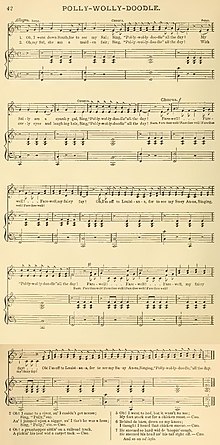Polly Wolly Doodle

"Polly Wolly Doodle" is a traditional American children's song. It was sung by Dan Emmett's Virginia Minstrels, who premiered at New York's Bowery Amphitheatre in February 1843,[1] and is often credited to Emmett (1815–1904).[2][3]
It was known to have been performed by the Yale Glee Club in 1878,[4] and was first published in a Harvard student songbook in 1880.[citation needed]
"Polly Wolly Doodle" appears in the manuscript for Laura Ingalls Wilder's novel, These Happy Golden Years (1943), exactly as it is used in the published version.[citation needed]
The melody of the song, as it is usually sung, formed the basis for Francis Blanche's 1946 song (recorded by Lily Fayol) "Le Gros Bill", Boney M.'s hit "Hooray! Hooray! It's a Holi-Holiday" in 1979,[5] as well as for Alexandra Burke's song "Start Without You". The tune is also found in children's music, including the Sunday school song "O-B-E-D-I-E-N-C-E", "Radio Lollipop" by the German group die Lollipops, and the Barney & Friends songs "Alphabet Soup" (using only the tune of the first verse) and "If I Had One Wish" (which uses both verses).
Notable recordings
[edit]- 1917: Harry C. Browne[6]
- 1926: Gid Tanner and the Skillet Lickers (as "Polly Wolly Doo")[7][6]
- 1939: Carter Family (as "Polly Wolly Doodle All Day")[6]
- 1940: Shirley Temple
- 1951: Pete Seeger[8]
- 1961: Bing Crosby included the song in a medley on his album 101 Gang Songs.
- 1962: Alvin and the Chipmunks on their album The Chipmunk Songbook
- 1964: Burl Ives[6]
- 1976: Leon Redbone on his album On the Track
- 1979: Boney M. (as "Hooray! Hooray! It's a Holi-Holiday")[6]
- 1979: Baton Baton Mein (as "Uthe sabke Kadam" by Amit Kumar, Pearl, Rajesh Roshan and Yogesh)
- 1982: Sandra Beech sings "Holi-Holiday" on her record, "Inch by Inch"
- 1989: Wee Sing Fun 'n' Folk
- 1991: The Singing Kettle (as "Mice on Ice" on their Christmas Cracker Show video; coincidentally two years later they recorded "Polly Wolly Doodle" with a different tune and set of lyrics for the Adventures in Kettleland video)
- 2002: VeggieTales on their album on CD, Bob and Larry's Backyard Party
- 2003: The Cheeky Girls (as "(Hooray, Hooray) It's A Cheeky Holiday")
- 2009: Alexandra Burke (as "Start Without You")
Appearances in film and television
[edit]- Shirley Temple sings "Polly Wolly Doodle" in the 1935 film The Littlest Rebel.
- The song is featured in two Frank Capra films: You Can't Take It with You (1938) and Pocketful of Miracles (1961).
- The song is the theme of the 1938 Donald Duck short film Good Scouts, in which it is played over the opening credits and sung by Donald and his nephews on their march.
- Clark Gable sings the song while wildcatting in the 1940 film Boomtown.
- Woody Woodpecker sings the song while driving his car in the opening scene of the 1947 short film Well Oiled.
- Character actor Frank Puglia sings the song continually (and eventually gets the whole Anderson family to sing along) in the first episode of season three of the TV show Father Knows Best. This episode originally aired 12 September 1956.
- The song appears towards the end of Sam Peckinpah's 1969 The Wild Bunch, sung by Strother Martin's character, Coffer.
- Julie Andrews sings the song in the opening faux-musical set piece of S.O.B (1981) and the tune is heard several times throughout the film.
- Robert Culp sings "Polly Wolly Doodle" in The Greatest American Hero - Season 3, Episode 4 (1982) - The Resurrection of Carlini
- The Kidsongs kids sing the song in the 1987 video "A Day at the Circus".
- The Juke Box Puppet Band performs the piece in an episode of Shining Time Station
- Kimmy Gibbler (Andrea Barber) sings the song in a 1991 episode of Full House.
- Mr. Hollywood sings the song constantly in episodes of 2 Stupid Dogs.
- In the Freakazoid Episode, Island of Dr. Mystico, The villains sing the song, poorly, in the plane scene.
- In the video games Pokémon Red, Green, Blue, and Yellow, as well as the Pokémon: Indigo League anime, the composition "Road to Viridian City Leaving Pallet Town" sounds similar to "Polly Wolly Doodle".
- The song is played in a get-well card in the Monk season 4 episode "Monk Stays in Bed" (2005).
- In the Even Stevens episode, “Little Mr. Sacktown”, Beans armpit farts to the tune of “Polly Wolly Doodle".
- In the video game Red Dead Redemption 2, NPC's can occasionally be heard playing the song on a banjo.
Parodies
[edit]In his medley "Schticks of One and Half a Dozen of the Other" (1963), Allan Sherman sings a song using the "Polly Wolly Doodle" tune, with lyrics describing his attempts to lose weight ("Oh, I diet all day and I diet all night / It's enough to drive me bats..."[1]
References
[edit]- ^ Lee Davis, Scandals and Follies: The Rise and Fall of the Great Broadway Revue (New York: Limelight Editions, 2000), p. 31., according to http://civilwartalk.com/threads/polly-wolly-doodle.15345/
- ^ Cooper, Karen (February 8, 2019). "Minstrelsy in Minnesota: Blackface wasn't only a southern problem". MinnPost. Retrieved August 28, 2020.
- ^ Miller, Michael (2008). The Complete Idiot's Guide to Music History: From Pre-Historic Africa to Classical Europe to American Popular Music. Penguin. p. 148. ISBN 9781592577514.
- ^ "Mention of Polly Wolly Doodle, sung by the Yale Glee Club in 1878". The Brooklyn Daily Eagle. May 26, 1878. p. 2 – via newspapers.com.
- ^ https://www.sonymusic.de/kuenstler/boney-m Archived 2020-06-23 at the Wayback Machine; in German
- ^ a b c d e "The Originals © by Arnold Rypens". Archived from the original on 2016-06-07.
- ^ "Country Music – Music News, New Songs, Videos, Music Shows and Playlists from CMT". Archived from the original on September 17, 2016.
- ^ "Lonesome Valley - A Collection of American Folk Music".
